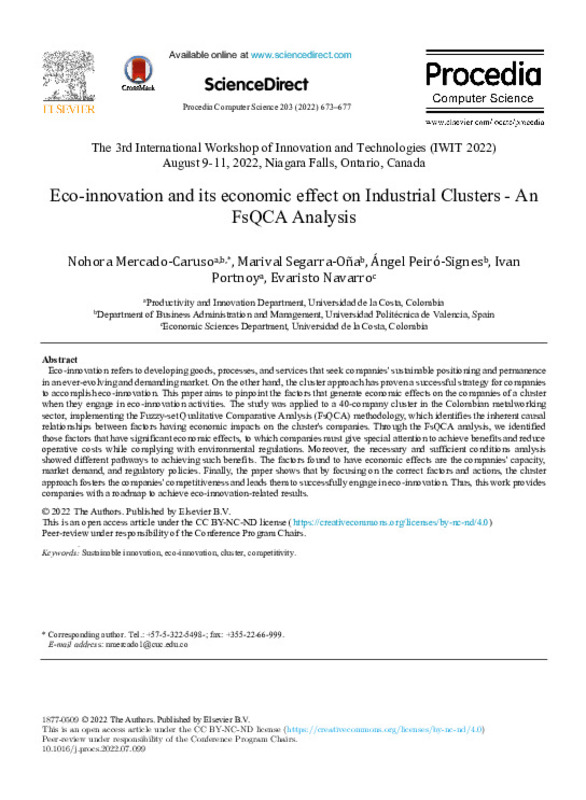JavaScript is disabled for your browser. Some features of this site may not work without it.
Buscar en RiuNet
Listar
Mi cuenta
Estadísticas
Ayuda RiuNet
Admin. UPV
Eco-innovation and its economic effect on Industrial Clusters - An FsQCA Analysis
Mostrar el registro sencillo del ítem
Ficheros en el ítem
| dc.contributor.author | Mercado-Caruso, Nohora
|
es_ES |
| dc.contributor.author | Segarra-Oña, Marival
|
es_ES |
| dc.contributor.author | Peiró Signes, Angel
|
es_ES |
| dc.contributor.author | Portnoy, Ivan
|
es_ES |
| dc.contributor.author | Navarro, Evaristo
|
es_ES |
| dc.date.accessioned | 2022-11-25T19:01:56Z | |
| dc.date.available | 2022-11-25T19:01:56Z | |
| dc.date.issued | 2022 | es_ES |
| dc.identifier.uri | http://hdl.handle.net/10251/190196 | |
| dc.description.abstract | [EN] Eco-innovation refers to developing goods, processes, and services that seek companies' sustainable positioning and permanence in an ever-evolving and demanding market. On the other hand, the cluster approach has proven a successful strategy for companies to accomplish eco-innovation. This paper aims to pinpoint the factors that generate economic effects on the companies of a cluster when they engage in eco-innovation activities. The study was applied to a 40-company cluster in the Colombian metalworking sector, implementing the Fuzzy-set Qualitative Comparative Analysis (FsQCA) methodology, which identifies the inherent causal relationships between factors having economic impacts on the cluster's companies. Through the FsQCA analysis, we identified those factors that have significant economic effects, to which companies must give special attention to achieve benefits and reduce operative costs while complying with environmental regulations. Moreover, the necessary and sufficient conditions analysis showed different pathways to achieving such benefits. The factors found to have economic effects are the companies' capacity, market demand, and regulatory policies. Finally, the paper shows that by focusing on the correct factors and actions, the cluster approach fosters the companies' competitiveness and leads them to successfully engage in eco-innovation. Thus, this work provides companies with a roadmap to achieve eco-innovation-related results. | es_ES |
| dc.language | Inglés | es_ES |
| dc.publisher | Elsevier | es_ES |
| dc.relation.ispartof | Procedia Computer Science | es_ES |
| dc.rights | Reconocimiento - No comercial - Sin obra derivada (by-nc-nd) | es_ES |
| dc.subject | Sustainable innovation | es_ES |
| dc.subject | Eco-innovation | es_ES |
| dc.subject | Cluster | es_ES |
| dc.subject | Competitivity | es_ES |
| dc.subject.classification | ORGANIZACION DE EMPRESAS | es_ES |
| dc.title | Eco-innovation and its economic effect on Industrial Clusters - An FsQCA Analysis | es_ES |
| dc.type | Artículo | es_ES |
| dc.identifier.doi | 10.1016/j.procs.2022.07.099 | es_ES |
| dc.relation.projectID | info:eu-repo/grantAgreement/UPV-VIN//1879//IMPACTO DE LAS PRÁCTICAS INNOVADORAS EN EL PERFORMANCE MEDIOAMBIENTAL DE LA EMPRESA: IDENTIFICACIÓN DE FACTORES MODERADORES./ | es_ES |
| dc.rights.accessRights | Abierto | es_ES |
| dc.contributor.affiliation | Universitat Politècnica de València. Facultad de Administración y Dirección de Empresas - Facultat d'Administració i Direcció d'Empreses | es_ES |
| dc.description.bibliographicCitation | Mercado-Caruso, N.; Segarra-Oña, M.; Peiró Signes, A.; Portnoy, I.; Navarro, E. (2022). Eco-innovation and its economic effect on Industrial Clusters - An FsQCA Analysis. Procedia Computer Science. 203:673-677. https://doi.org/10.1016/j.procs.2022.07.099 | es_ES |
| dc.description.accrualMethod | S | es_ES |
| dc.relation.publisherversion | https://doi.org/10.1016/j.procs.2022.07.099 | es_ES |
| dc.description.upvformatpinicio | 673 | es_ES |
| dc.description.upvformatpfin | 677 | es_ES |
| dc.type.version | info:eu-repo/semantics/publishedVersion | es_ES |
| dc.description.volume | 203 | es_ES |
| dc.identifier.eissn | 1877-0509 | es_ES |
| dc.relation.pasarela | S\474810 | es_ES |
| dc.contributor.funder | UNIVERSIDAD POLITECNICA DE VALENCIA | es_ES |
| dc.subject.ods | 12.- Garantizar las pautas de consumo y de producción sostenibles | es_ES |








